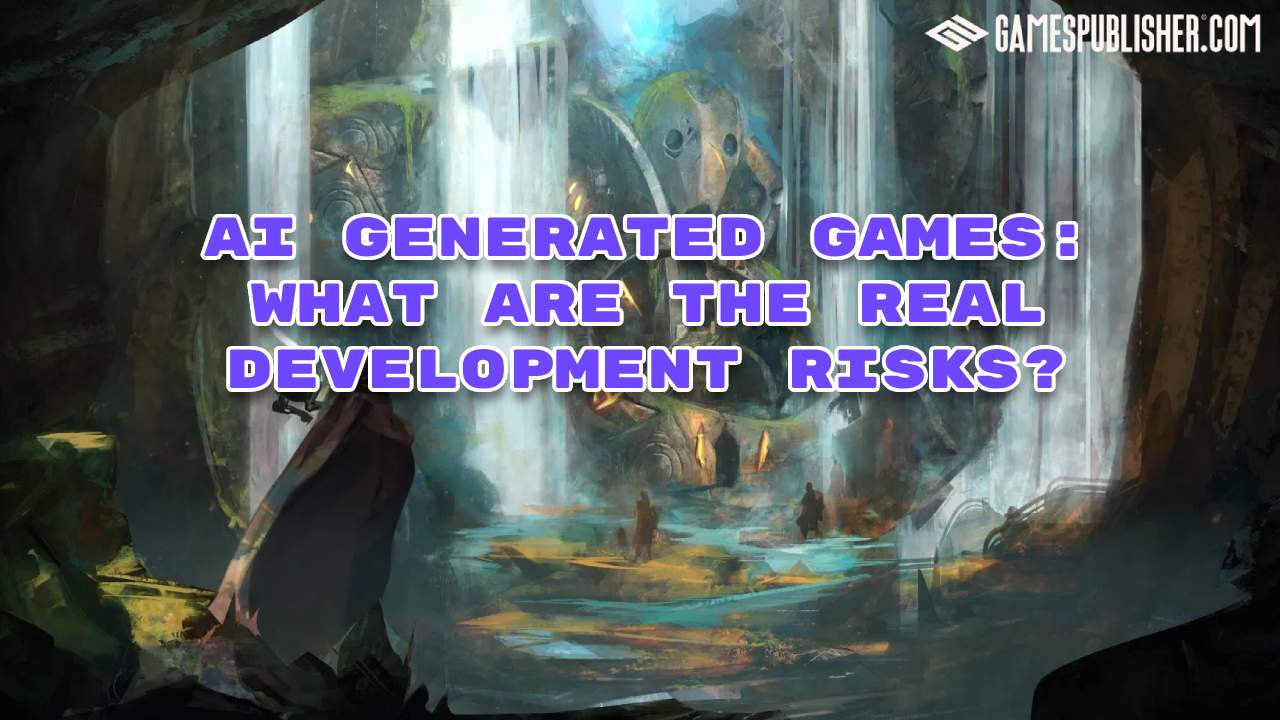At Gamespublisher.com, we explore the evolving landscape of AI-driven game development and game publishing, and a few trends are shaking up the industry like AI generated games — a major example of how AI is used in video games today.
Powered by rapid advances in generative AI, these titles are changing how games are built, played, and even imagined.
From automated level design to entire worlds crafted by algorithms, AI is making game creation faster and more accessible than ever before.
But with innovation comes uncertainty. Questions around originality, ownership, and creative control are now at the forefront of the gaming conversation.
Understanding both the potential and the real development risks of AI generated games is essential not only for developers and publishers but also for marketers, investors, and players navigating this next era of gaming.
AI Generated Games and the Future of Game Development
AI generated games refer to titles created or enhanced through machine learning, procedural generation, and generative AI tools. They represent one of the most advanced uses of artificial intelligence in computer games.
These systems can autonomously design levels, produce dialogue, generate art assets, compose music, or even simulate dynamic AI NPC game behavior — all with minimal human intervention.
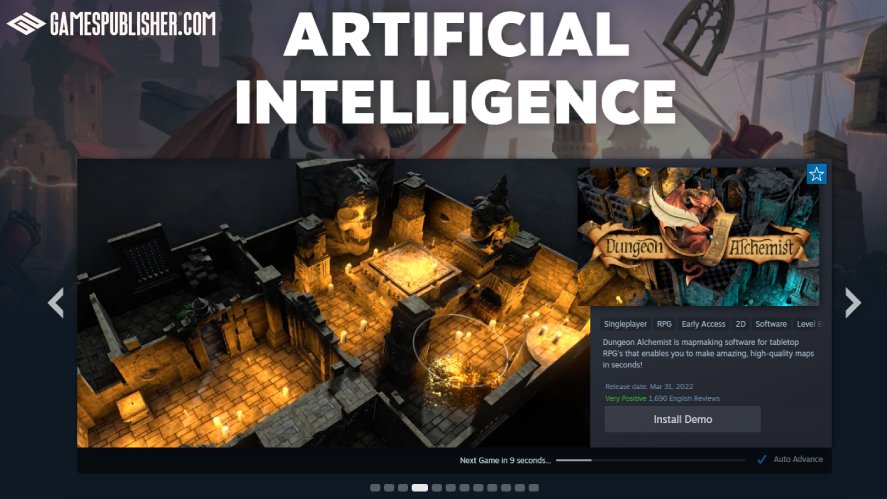
In 2025, developers are increasingly using AI to streamline complex workflows:
- Level design powered by procedural content generation ensures endless replayability.
- Character modeling and animation pipelines are sped up through AI-created game assets and AI-assisted artistry.
- Dialogue generation uses large language models to create realistic, adaptive NPC conversations.
- Some experimental projects are now attempting fully AI-generated games, from concept to code.
The appeal is undeniable: reduced development costs, faster production cycles, and seemingly infinite creative potential.
For indie developers, this technology levels the playing field; for large studios, it promises massive efficiency gains.
Yet, as we’ll explore next, this new frontier also introduces significant challenges in ethics, quality assurance, and creative authenticity.
AI Generated Games: Ethical and Legal Risks
As AI generated video games become more common, they raise complex ethical and legal challenges that the gaming industry is still struggling to address.
From copyright violations to questions of ownership and data ethics, these issues could significantly shape how developers and publishers use AI tools moving forward.
Copyright Infringement in AI Generated Games
One of the biggest risks lies in how generative models are trained.
Many AI systems learn from massive datasets containing copyrighted assets, including textures, artwork, or sound effects from existing games.
When these models produce similar or derivative outputs, developers may unknowingly create infringing content.
This not only exposes studios to legal liabilities but also threatens creative integrity, as AI-generated assets may blur the line between inspiration and imitation.
Ownership and Intellectual Property Issues
Who truly owns an AI generated game asset? The developer who prompted it, the AI platform, or the creators of the training data?
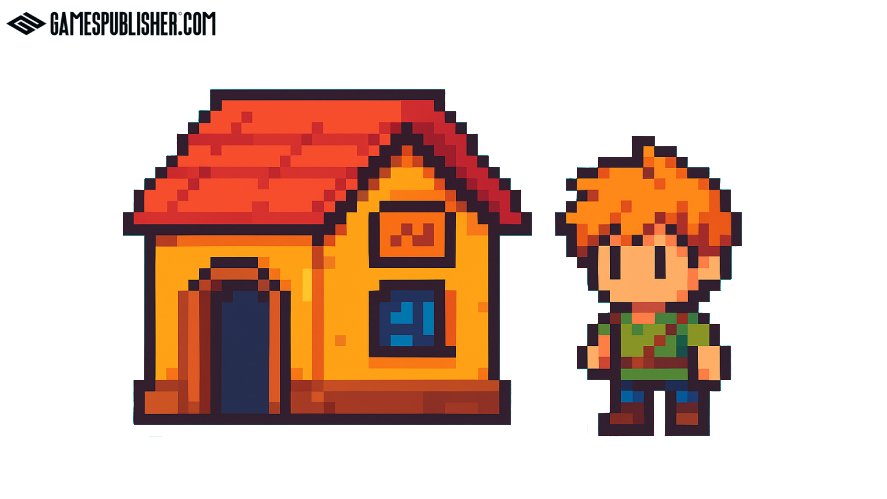
This question remains legally unsettled across many jurisdictions. Without clear intellectual property laws surrounding generative AI in games, game publishers risk disputes over asset ownership and monetization rights.
In multi-studio collaborations, this becomes even murkier, as AI-generated code or art may lack identifiable authorship.
Ethical Implications of Using Unconsented Data
Many generative models have been trained on publicly available but unconsented data, including indie game art, forum posts, and user-generated content.
Using such data without permission not only raises ethical concerns but also damages trust between developers and the AI in gaming industry.
Independent creators are especially vulnerable, as their work might fuel tools that undercut their livelihood, effectively competing with their own creations.
AI Generated Games: Gameplay and Quality Concerns
Beyond legal questions, AI generated games also face practical design and gameplay risks.
While generative systems can produce impressive content at scale, the results often lack the emotional and structural cohesion that defines great games.
Inconsistency in Narrative and World Design
AI-driven content creation can lead to disjointed storylines, repetitive environments, or illogical quest structures.
Without human oversight, AI may generate worlds that feel hollow or inconsistent, undermining immersion and narrative flow.
For story-heavy video game genres like RPGs or adventures, this inconsistency can break the player’s emotional connection, turning innovation into frustration.
Lack of Emotional Depth and Human Creativity
AI excels at pattern recognition, but not at emotional storytelling. It struggles with nuance, symbolism, and the cultural context that human designers naturally bring to their work.

As a result, AI-generated narratives may lack empathy or cultural authenticity, producing characters that feel robotic or dialogue that falls flat.
Games risk losing the “human touch” that makes stories resonate.
Risk of Game-breaking Bugs and Balancing Issues
Generative AI in video games doesn’t always grasp game logic or balance. It might create mechanics or item systems that unintentionally break progression, over-empower players, or render key gameplay loops ineffective.
Since AI operates without deep player experience insight, it often overlooks the trial-and-error refinement that human designers rely on to make games fair, fun, and replayable.
AI Generated Games: Impact on Game Developers and Studios
The integration of generative AI into game development promises speed and efficiency. But it also raises deep concerns about the future of creative roles, innovation, and studio culture.
As automation expands, developers must balance technological progress with the preservation of human creativity and fairness in the workplace.
Displacement of Creative Roles
AI-generated content poses a real threat to writers, artists, and designers whose work can now be partially automated.
Narrative designers might see AI handling dialogue and quest generation; concept artists may find their roles shrinking as studios rely on text-to-image tools.
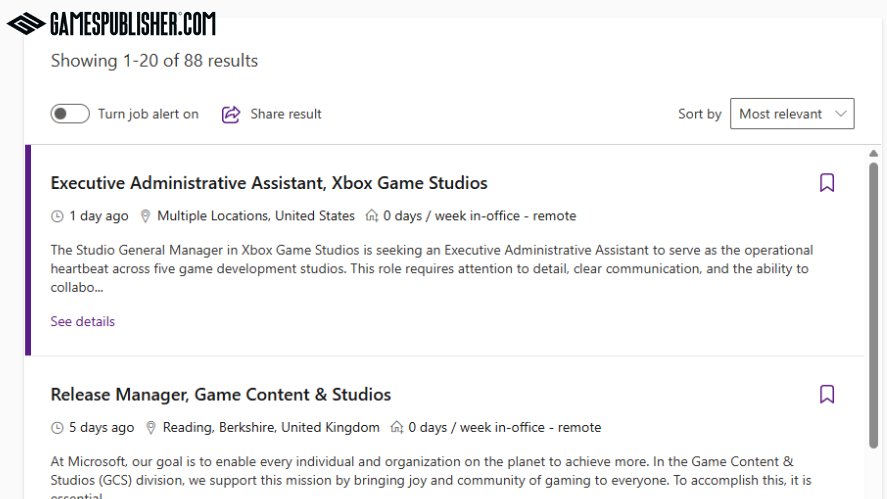
While some studios position AI as a “co-pilot”, others may use it to cut costs, leading to fewer creative positions and diminished opportunities for human talent to grow within the industry.
The result could be a homogenization of game design: efficient, but soulless.
Over-reliance on AI and Loss of Innovation
When studios depend too heavily on AI, they risk creative stagnation.
Generative systems learn from existing data, meaning they replicate what has already been done rather than pioneering new ideas.
If developers rely on AI for ideation or gameplay design, the industry could see a wave of formulaic releases lacking originality.
In contrast, human creativity thrives on intuition, cultural context, and emotional resonance — elements AI still cannot truly replicate.
Pressure on Indie Developers
For indie studios, AI tools offer both promise and pressure. On one hand, they provide powerful shortcuts for asset creation, dialogue writing, and world-building.
On the other hand, small teams may feel compelled to adopt AI to remain competitive against larger video game publishers using it aggressively.
This pressure can lead to ethical compromises, increased technical debt, and potential dependency on unstable or costly AI platforms.
In the long run, this may widen the gap between indie developers and major studios rather than leveling the playing field.
AI Generated Games: Security and Player Risks
As AI becomes embedded in gameplay systems and personalization features, player safety and data security emerge as critical concerns.
From algorithmic bias to exploitable AI-generated content, these risks extend far beyond development, directly affecting players’ experiences and trust.
In-game Bias and Offensive Content
Generative AI models reflect the biases present in their training data.
This means AI-generated NPCs, dialogue, or narratives can unintentionally reproduce stereotypes, offensive language, or exclusionary behaviors.
Such incidents can harm a game’s reputation and alienate entire communities, especially in regions sensitive to cultural or political representation.
Therefore, studios must implement strong moderation and ethical AI frameworks to detect and prevent biased content before release.
Exploits and Vulnerabilities in Procedural Systems
AI-generated systems can also create unintended exploits or design flaws.
Procedural generation may produce broken progression paths, overpowered items, or exploitable mechanics that undermine balance.
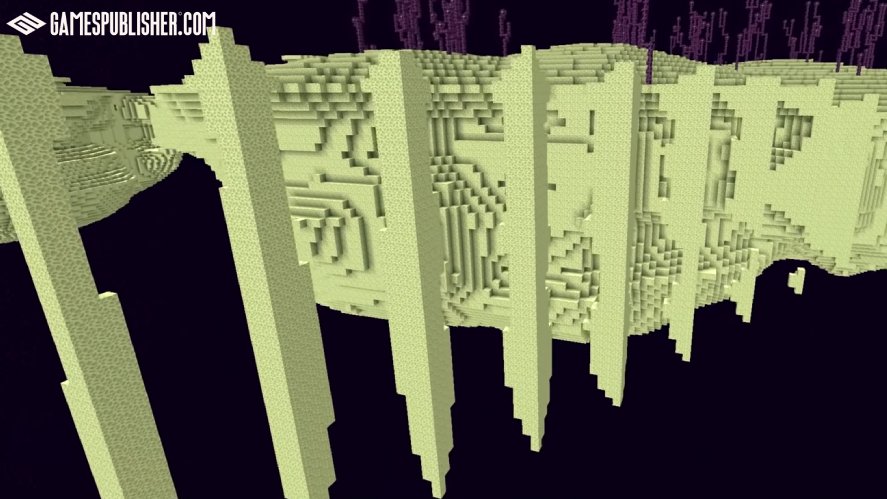
In multiplayer environments, these flaws can be weaponized by players, or even hackers, leading to gameplay instability and security risks.
Continuous human QA oversight and adaptive AI monitoring are essential to maintain fair, secure play.
Privacy Risks through AI-Driven Personalization
Many AI generated video games use personalization algorithms that analyze player behavior to tailor content, difficulty, or in-game recommendations.
While this can enhance engagement, it also opens the door to privacy violations if sensitive data is mishandled.
Without transparent consent and data safeguards, these systems may collect more information than players realize, from play habits to emotional responses.
For game developers and publishers, ensuring ethical data use and compliance with privacy laws (like GDPR) is no longer optional; it’s fundamental to maintaining trust in AI-driven gaming.
Can AI Generated Games Be Regulated or Standardized?
As generative AI reshapes game development, both governments and industry leaders are racing to set guardrails.
Regulations like the EU AI Act and ongoing copyright lawsuits have already pushed for clearer accountability, data transparency, and ethical use of AI models in creative industries.
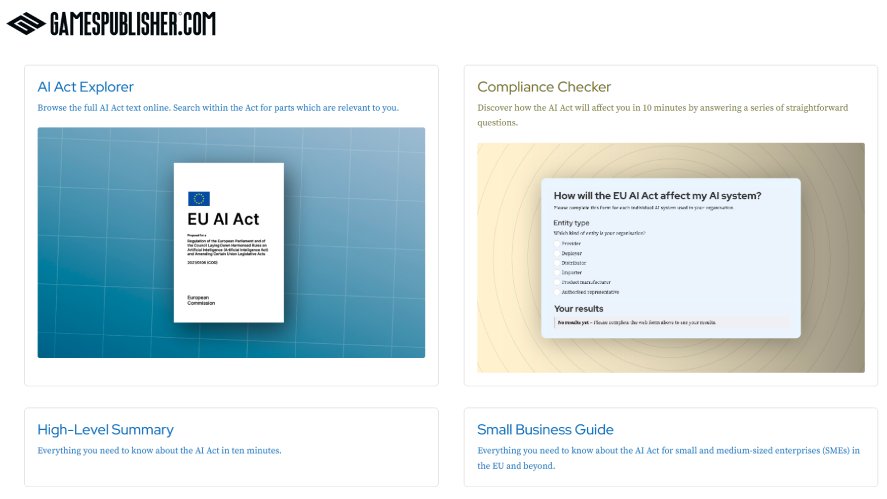
In addition, transparency and disclosure remain top priorities.
Proposals include requiring AI developers to reveal training datasets, attach “model cards” summarizing risks, and provide content warnings or disclosures when AI is used in games.
These measures aim to protect both creators and players from misuse or unconsented data use.
For now, studios can stay ahead by adopting self-regulation practices:
- Use licensed or proprietary datasets whenever possible.
- Keep clear documentation of AI tools, data sources, and ownership rights.
- Implement human review for all AI-generated content to ensure quality and compliance.
- Be transparent with players about personalization and data collection.
While full regulation will take time, developers who embrace ethical AI practices now will be best positioned to innovate responsibly, and avoid legal or reputational fallout as standards evolve.
Conclusion
Artificial intelligence for games offers enormous creative and operational benefits: faster asset pipelines, procedural worlds, and novel player experiences.
But they also carry real legal, ethical, and security risks: copyright exposure, dataset consent problems, biased or offensive outputs, gameplay exploits, and privacy concerns.
For developers and publishers reading Gamespublisher.com: treat generative AI as powerful tooling — not a shortcut around responsibility.
Adopt transparency, human oversight, careful dataset sourcing, and robust legal and ethical reviews now. Doing so protects players and your studio’s long-term creative value while enabling the meaningful innovations AI promises.
Loading survey...

